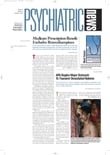Valproate (Depakote) appears to be effective not only in treating mood symptoms associated with bipolar disorder, but also in reducing drinking in those patients with co-occurring alcoholism.
Data from a small, randomized, double-blind, controlled trial indicate that dual effectiveness is the result of independent effects on the two different disorders. The data provide support for the use of valproate to treat the more than half of all patients with bipolar disorder who have co-occurring substance abuse disorders. Among those with co-occurring substance abuse, alcoholism is the most frequent.
“This has really been a population that has been previously neglected in research,” noted Ihsan Salloum, M.D., M.P.H., an associate professor of psychiatry at the University of Pittsburgh School of Medicine. “Most clinical trials involving patients with bipolar disorder have used `pure' patients; they have excluded those with co-occurring disorders, and conversely, those studies with patients who have substance abuse disorders have commonly excluded any patients who have any co-occurring psychiatric disorder.”
The result, Salloum told Psychiatric News, is a void in the evidence base. Yet physicians dealing with a patient with bipolar disorder know that “they are dealing with a patient who most likely also has a substance abuse disorder. The degree of difficulty in treating the patient is much worse; there simply are no clear guidelines that address these comorbid problems.”
Salloum and his colleagues had been encouraged by recent reports of small trials studying the use of several anticonvulsant mood stabilizers, including valproate and topiramate, in patients with alcoholism. Valproate, Salloum noted, had already been granted an indication for bipolar disorder, so he and his team set out to look at the effects of the drug in patients with both bipolar and alcoholism.
They enrolled 59 patients with bipolar I disorder and alcoholism in a 24-week, double-blind, placebo-controlled, randomized parallel group trial. Recognizing that it would be unethical to have patients in a trial for 24 weeks on placebo only, Salloum and his colleagues added lithium to the protocol. All patients in the trial received “treatment as usual”—which included lithium plus a psychosocial intervention that included individual psychotherapy focused on the patients dealing with both disorders as well as taking medication. In addition, patients were then randomly assigned to have either valproate or placebo added to their treatment as usual.
The group receiving valproate was found to have a significantly lower proportion of heavy drinking days and a trend toward fewer drinks per drinking day compared with those who received placebo.
“When we added medication adherence as a variable, both findings became statistically significant,” Salloum noted. “That is, those patients who had higher serum levels of valproate had significantly better alcohol use outcomes overall—in reduced proportion of heavy drinking days and in fewer drinks per heavy drinking day, as well as fewer drinks per day throughout the study.”
Valproate therapy also significantly prolonged the time to relapse to sustained heavy drinking, to an average of 93 days, compared with an average of 62 days for those on placebo.
Salloum and his colleagues also monitored mood symptoms but saw no statistically significant differences between the two groups.
“The study was relatively small,” Salloum noted. “Perhaps if we had had more patients, we may have had more power to detect a difference. But all patients were receiving lithium for their bipolar symptoms, so the addition of valproate may not have made a noticeable difference.”
Nonetheless, Salloum added, “I think this is an encouraging study. It is really the first to be done in this dually diagnosed adult population using a double-blind, placebo-controlled paradigm.”
Salloum's hope is that the trial will be replicated with larger numbers of patients and in multiple clinical sites.
Arch Gen Psychiatry 2005 62 37
